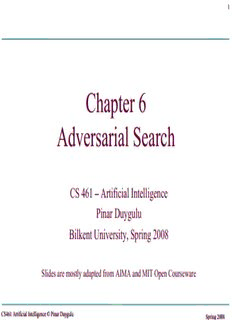
Chapter 6 Adversarial Search - Bilkent University PDF
Preview Chapter 6 Adversarial Search - Bilkent University
1 Chapter 6 Adversarial Search CS 461 – Artificial Intelligence Pinar Duygulu Bilkent University, Spring 2008 Slides are mostly adapted from AIMA and MIT Open Courseware CS461 Artificial Intelligence © Pinar Duygulu Spring 2008 2 Outline • Games • Optimal decisions • Minimax algorithm • α-β pruning • Imperfect, real-time decisions CS461 Artificial Intelligence © Pinar Duygulu Spring 2008 3 Games • Multi agent environments : any given agent will need to consider the actions of other agents and how they affect its own welfare. • The unpredictability of these other agents can introduce many possible contingencies • There could be competitive or cooperative environments • Competitive environments, in which the agent’s goals are in conflict require adversarial search – these problems are called as games CS461 Artificial Intelligence © Pinar Duygulu Spring 2008 4 Games • In game theory (economics), any multiagent environment (either cooperative or competitive) is a game provided that the impact of each agent on the other is significant • AI games are a specialized kind - deterministic, turn taking, two-player, zero sum games of perfect information • In our terminology – deterministic, fully observable environments with two agents whose actions alternate and the utility values at the end of the game are always equal and opposite (+1 and –1) CS461 Artificial Intelligence © Pinar Duygulu Spring 2008 5 Games – history of chess playing • 1949 – Shannon paper – originated the ideas • 1951 – Turing paper – hand simulation • 1958 – Bernstein program • 1955-1960 – Simon-Newell program • 1961 – Soviet program • 1966 – 1967 – MacHack 6 – defeated a good player • 1970s – NW chess 4.5 • 1980s – Cray Bitz • 1990s – Belle, Hitech, Deep Thought, • 1997 - Deep Blue - defeated Garry Kasparov CS461 Artificial Intelligence © Pinar Duygulu Spring 2008 6 Game Tree search CS461 Artificial Intelligence © Pinar Duygulu Spring 2008 7 Partial Game Tree for Tic-Tac-Toe CS461 Artificial Intelligence © Pinar Duygulu Spring 2008 8 Game tree (2-player, deterministic, turns) CS461 Artificial Intelligence © Pinar Duygulu Spring 2008 9 Optimal strategies • In a normal search problem, the optimal solution would be a sequence of moves leading to a goal state - a terminal state that is a win • In a game, MIN has something to say about it and therefore MAX must find a contingent strategy, which specifies – MAX’s move in the initial state, – then MAX’s moves in the states resulting from every possible response by MIN, – then MAX’s moves in the states resulting from every possible response by MIN to those moves – … • An optimal strategy leads to outcomes at least as good as any other strategy when one is playing an infallible opponent CS461 Artificial Intelligence © Pinar Duygulu Spring 2008 10 Minimax • Perfect play for deterministic games • Idea: choose move to position with highest minimax value = best achievable payoff against best play • E.g., 2-ply game: CS461 Artificial Intelligence © Pinar Duygulu Spring 2008
Description: